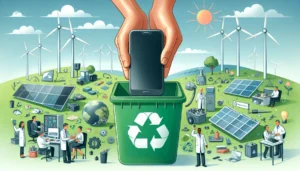The technology industry has long been associated with innovation and progress, but increasingly, major tech companies are redefining what progress means. No longer is it just about faster processors or sleeker designs—it’s about creating a sustainable future. Apple, Google, Microsoft, and Amazon have committed billions of dollars to environmental initiatives, fundamentally changing how the tech sector operates. This transformation represents more than corporate responsibility; it’s a business imperative driven by consumer demand, regulatory pressure, and the urgent need to address climate change. The shift toward sustainability is reshaping everything from data center operations to product design, creating ripple effects throughout the entire industry.
Energy Efficiency
Tech giants consume enormous amounts of energy, particularly through their data centers that power cloud services, search engines, and streaming platforms. Companies like Google have achieved carbon neutrality for their operations, while Microsoft has committed to being carbon negative by 2030. These companies are investing heavily in renewable energy infrastructure, with Amazon becoming the world’s largest corporate purchaser of renewable energy. Data centers now utilize advanced cooling systems, artificial intelligence to optimize energy usage, and server designs that maximize computational efficiency per watt consumed. The impact extends beyond individual companies—when tech giants demand renewable energy, they drive investment in wind and solar projects that benefit entire regions. Smart home technology, similar to the energy-saving devices that help homeowners reduce consumption by up to 25%, is being scaled up to manage massive corporate energy needs with unprecedented precision.
Sustainable Products
Product sustainability has become a core design principle for major tech companies, influencing everything from material selection to packaging. Apple has committed to using 100% recycled materials in its products and has eliminated plastic from much of its packaging. Google’s Pixel phones now incorporate recycled materials, while Microsoft’s Surface devices use recycled ocean plastic in their construction. The focus extends to product longevity, with companies providing longer software support cycles and designing devices for easier repair and component replacement. This approach reduces electronic waste while maintaining product performance and user satisfaction. The circular economy model is gaining traction, where products are designed from the outset to be disassembled and recycled at the end of their lifecycle. Companies are also rethinking packaging, moving away from elaborate presentations toward minimal, recyclable materials that protect products during shipping without creating unnecessary waste.
Supply Chain Responsibility
The environmental impact of tech products extends far beyond corporate headquarters and manufacturing facilities. Major tech companies are implementing comprehensive supply chain sustainability programs, requiring suppliers to meet strict environmental standards and adopt renewable energy sources. Apple has helped over 100 suppliers transition to renewable energy, while Google works with partners to reduce the carbon footprint of component manufacturing. Supply chain transparency has become crucial, with companies tracking the environmental impact of materials from extraction through production. This includes addressing issues like conflict minerals, water usage in semiconductor manufacturing, and the carbon footprint of global shipping. The complexity of modern supply chains means that sustainable practices must be implemented across multiple countries and industries, creating a multiplier effect that extends environmental benefits far beyond the tech sector itself.
Green Initiatives
Beyond operational changes, tech giants are launching innovative programs to accelerate environmental progress across society. Amazon’s Climate Pledge commits the company to net-zero carbon emissions by 2040 while investing $10 billion in climate solutions through the Bezos Earth Fund. Microsoft has created a $1 billion Climate Innovation Fund to invest in technologies that reduce carbon emissions. Google has committed to helping cities reduce one gigaton of carbon emissions through technology solutions. These initiatives often focus on leveraging technology to solve environmental challenges in other sectors, such as using AI to optimize energy grids or developing satellite technology to monitor deforestation. The scale of these investments demonstrates how tech companies are positioning themselves as leaders in the global response to climate change, using their technological expertise and financial resources to drive systemic change.
Challenges and Criticisms
Despite significant investments in sustainability, tech giants face ongoing challenges and criticisms regarding their environmental impact. The rapid growth of cloud computing and streaming services continues to drive up energy consumption, even as efficiency improvements reduce per-unit energy usage. Electronic waste remains a significant problem, with billions of devices reaching end-of-life each year and recycling infrastructure struggling to keep pace. Critics argue that planned obsolescence practices contradict sustainability goals, as frequent device upgrades contribute to waste generation. The manufacturing of semiconductors requires significant energy and water resources, creating environmental impacts that companies are still working to address. Additionally, the global nature of tech supply chains makes it difficult to ensure consistent environmental standards across all operations. Some environmental groups argue that companies should focus more on reducing overall consumption rather than simply making existing practices more efficient.
Future Trends
The future of sustainability in the tech sector points toward even more ambitious goals and innovative approaches. Circular economy principles are becoming standard practice, with companies designing products for complete recyclability and developing take-back programs for end-of-life devices. Carbon capture technology is being explored as a way to address historical emissions, while advances in renewable energy storage make it easier to power operations entirely with clean energy. Artificial intelligence is being deployed to optimize environmental performance across all aspects of business operations, from supply chain management to energy consumption. The integration of sustainability metrics into business decision-making processes means environmental considerations are becoming as important as financial performance. Collaboration between tech companies is increasing, with industry-wide initiatives to address shared environmental challenges and establish common sustainability standards.
Consumer Impact
Tech companies’ sustainability efforts are creating new opportunities for consumers to reduce their environmental impact through technology adoption. Smart home devices can help households reduce energy consumption by up to 25%, while cloud services eliminate the need for energy-intensive personal servers and storage systems. Product-as-a-service models are emerging, allowing consumers to access the latest technology without owning physical devices, which reduces overall resource consumption. Companies are providing better tools for consumers to understand and reduce their digital carbon footprints, including features that show the environmental impact of various online activities. The shift toward sustainable products is making it easier for environmentally conscious consumers to make responsible purchasing decisions without sacrificing functionality or performance. Education and awareness campaigns are helping consumers understand how their technology choices impact the environment and what steps they can take to minimize their footprint.
Building a Sustainable Digital Future
The transformation of the tech sector toward sustainability represents one of the most significant shifts in corporate environmental responsibility. Major tech companies are not just adapting to environmental regulations—they’re actively driving the development of solutions that will benefit society as a whole. The combination of operational improvements, product innovation, and investment in environmental technologies creates a comprehensive approach to addressing climate change. As these companies continue to grow and expand their global influence, their sustainability practices will likely become even more important in determining their long-term success. The tech sector’s embrace of sustainability demonstrates that environmental responsibility and business success are not mutually exclusive but rather complementary goals that can drive innovation and create lasting value for all stakeholders.




